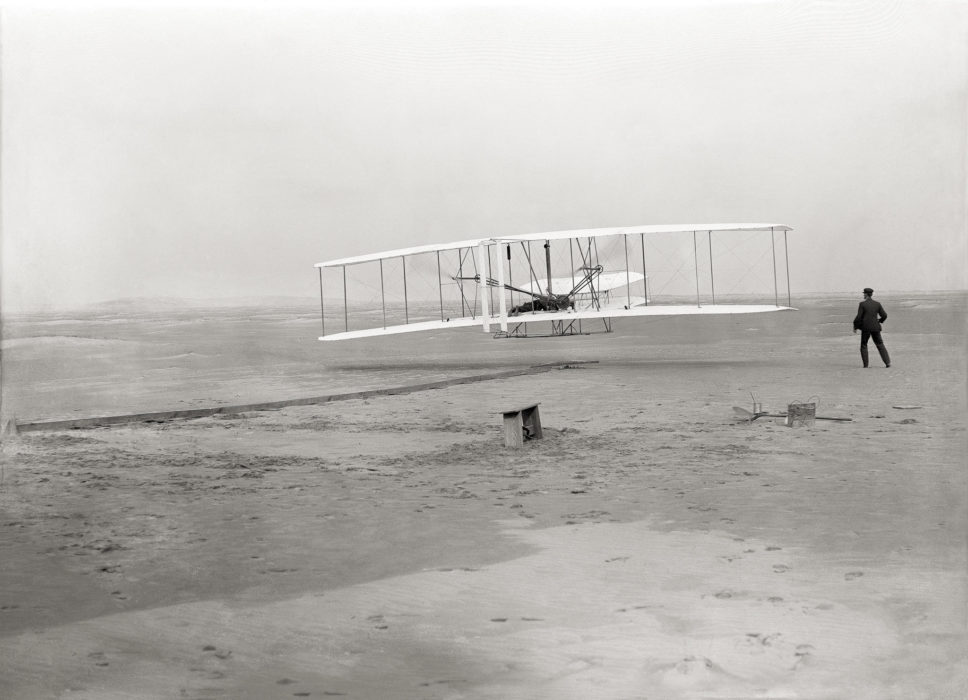IN THE EARLY MORNING hours of December 17, 1903, two brothers left their camp in the Kill Devil Hills, a few miles north of Cape Hatteras, North Carolina, and made their way to a fishing village at the base. The village, called Kitty Hawk, offered an endless expanse of beach alongside the Atlantic and a steady supply of strong winds.
They were the Wright brothers – Wilbur and Orville – and they were about to make history.
At 10:35 a.m. their invention, the Wright Flyer, lifted off the ground with Orville at the controls. The plane bobbed up and down as it sailed slowly over the sand, coming to rest with a thud just twelve seconds later. It was a short flight, but, nevertheless, a successful one.
Orville commented on the first flights at Kitty Hawk: “The desire to fly is an idea handed down to us by our ancestors who, in their grueling travels across trackless lands in prehistoric times, looked enviously on the birds soaring freely through space, at full speed, above all obstacles, on the infinite highway of air.” Wilbur added: “More than anything else the sensation is one of perfect peace mingled with an excitement that strains every nerve to the utmost . . .”
The invention of flight was an example of the ingenuity and aspiration that ‘Abdu’l-Bahá found so compelling in Americans. What surprised many was his eager embrace of technology. When speaking to Americans about the spiritual nature of humankind — in essence, what sets us apart from animals — ‘Abdu’l-Bahá turned to technological examples.
“A human being can soar in the skies or speed in submarine depths,” he told an audience in New York on April 15. “All the sciences, arts and discoveries were mysteries of nature, and according to natural law these mysteries should remain latent, hidden; but man has proceeded to break this law, free himself from this rule and bring them forth into the realm of the visible.”
In the early morning hours of November 1, 1911, a lone aircraft took off from a desert strip and headed towards a Turkish camp at Ain Zaram on the outskirts of modern-day Tripoli. A dispute had erupted between the Italians and the Ottoman Empire in their conflict over control of Libya.
The aircraft, known as the “Taube” (German for “dove”) looked like a giant ominous bird. Lieutenant Giulio Gavotti of the Italian army sat at its controls. Once in position over the camp, he proceeded to drop four Cipelli grenades from his cockpit, each weighing four-and-a-half pounds, as the Turks scrambled below.

“The greatest intelligence of man is being expended in the direction of killing his fellow man,” ‘Abdu’l-Bahá had said in his interview with the munitions maker Hudson Maxim in New York. “The discovery of high explosives, perfecting of death-dealing weapons of war, the science of military attack, all this is a wonderful manifestation of human intelligence, but it is in the wrong direction.”
During ‘Abdu’l-Bahá’s time in the West, he spoke often about the dangers of material progress unhinged from spiritual and moral development. In New York he offered an aeronautical metaphor to define a dilemma central to modern progress: “Two wings are necessary. One wing is physical power and material civilization; the other is spiritual power and divine civilization. With one wing only, flight is impossible . . . no matter how much material civilization advances, it cannot attain to perfection except through the uplift of spiritual civilization.”
The possibilities of the airplane proved too much for military engineers to resist. In 1918, as World War I was coming to an end, American Brigadier General William Mitchell, the father of the U.S. Air Force, commented: “The day has passed when armies on the ground or navies on the sea can be the arbiter of a nation’s destiny in war. The main power of defense and the power of initiative against an enemy has passed to the air.”
Only fifteen years had transpired since the Wright brothers had first gotten their fragile Flyer off the ground.






